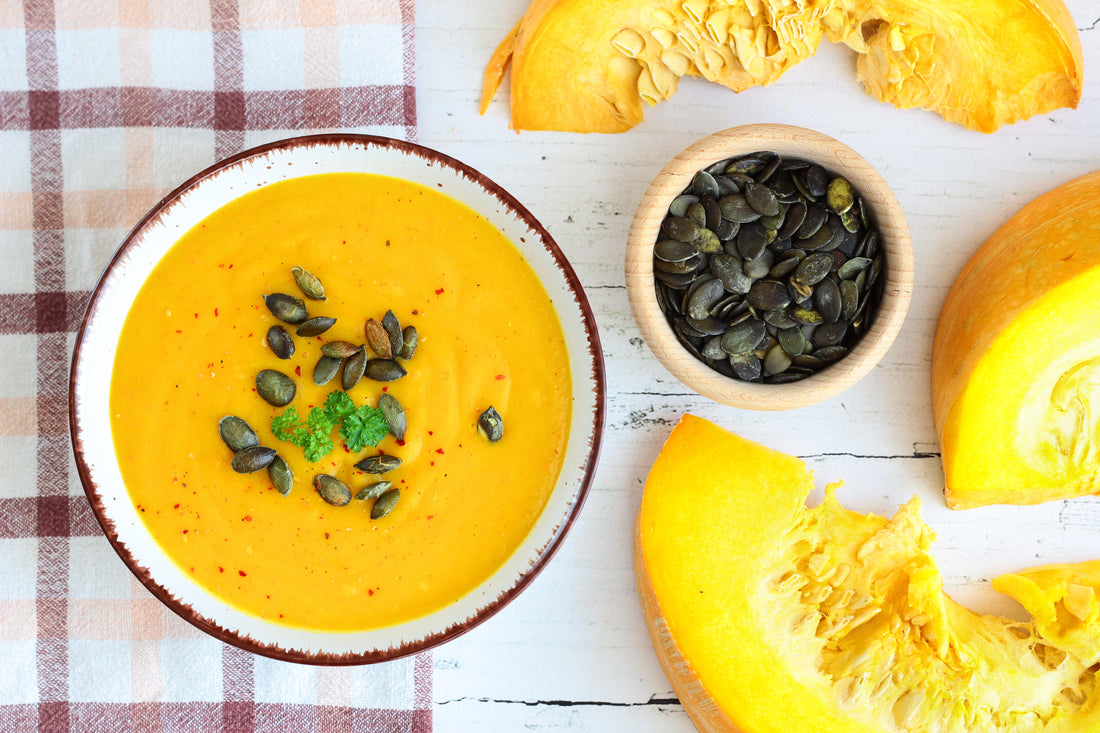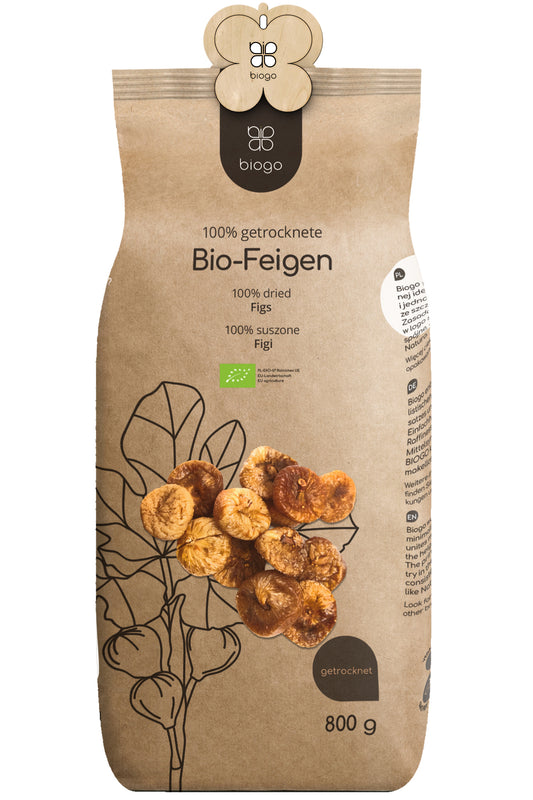- The use of pumpkin seeds
- Pumpkin seeds are one of the best sources of magnesium in the diet
- Pumpkin seeds as a source of iron in the diet
- How can pumpkin seeds improve prostate health?
- Pumpkin seeds and cardiovascular health
- Antiparasitic effect of pumpkin seeds
- Pumpkin seeds can improve our immunity
- Other properties of pumpkin seeds
- Summary
Pumpkin is an extremely healthy vegetable, and we can also prepare a whole range of different dishes with it. It works well in the form of soup, pancakes, or fries. Its versatility makes it extremely popular in our country. However, it's also worth remembering the seeds it contains. After all, they often end up in the trash, and that's a big mistake. Not only are we wasting food this way, but more importantly, we're getting rid of an extremely nutrient-rich product. Pumpkin seeds certainly deserve to be called a "superfood," and we'll try to prove it.
The use of pumpkin seeds
In the food industry, pumpkin seeds are primarily used to produce unrefined oil. It's extremely healthy and recommended to be eaten cold. However, it's important to remember that their low smoke point makes them unsuitable for frying, and more importantly, they lose their health-promoting properties when heated. These seeds are also a common ingredient in all kinds of spreads, not necessarily vegan, and make an excellent base. They're also found in baked goods, for example, but can also be added to salads or even desserts. Pumpkin seeds are also relatively inexpensive compared to their nutritional value. They can be found in most stores, dried, roasted, or hidden within the pumpkin itself. The most beneficial nutrients are naturally found in fresh pumpkin seeds, so it's worth buying a whole pumpkin to get them.
Pumpkin seeds are one of the best sources of magnesium in the diet
Pumpkin seeds are one of the best sources of magnesium among foods. Just a handful can provide us with about 40% of our daily needs for this mineral. However, just 100 grams of seeds contain up to 600 milligrams. All this makes them an easy way to supplement magnesium deficiency. It's worth noting that nearly 75% of the world's population may suffer from a deficiency. Our daily diet often doesn't fully meet our needs for this micronutrient, which can have numerous negative health consequences. Furthermore, it's involved in nearly 300 different chemical processes in our body. It has a major impact on the proper functioning of the cardiovascular system and the entire nervous system. Yes, we can also take all kinds of supplements, which certainly help balance magnesium levels in the blood, but naturally occurring products are usually the best dietary choice. It's also worth noting that pumpkin seeds can also be a source of zinc, as they contain about 8 mg of this element in 100 grams. This means that this amount can cover about 15% of the daily requirement.
Pumpkin seeds as a source of iron in the diet
The best source of iron is red meat. Eating it provides us with relatively large amounts of this microelement, and it is also relatively well absorbed. However, there are many situations in which we don't want to or can't eat meat for some reason and therefore somehow limit our iron intake. In such situations, one of the better solutions is simply reaching for pumpkin seeds. A handful covers about 18% of the daily requirement for this nutrient. Let's add that non-heme iron, which is found even in the aforementioned seeds, is less absorbable than heme iron—that is, iron of animal origin. However, it is still a much better solution than, for example, resorting to various supplements containing this nutrient. It is worth noting that iron absorption can be improved by consuming it with products rich in vitamin C.
How can pumpkin seeds improve prostate health?
As it turns out, pumpkin seeds can have a major impact on prostate health. A number of studies were conducted in which male rats were given pumpkin seeds. The results of these experiments were very interesting, as it was observed that the oil contained in the seeds can inhibit prostate hyperplasia. Furthermore, it can also counteract this in the future by limiting the negative effects of excess testosterone on this gland. Furthermore, the consumption of pumpkin seeds is recommended for men of childbearing age. This is influenced, of course, by the aforementioned zinc, but also by the high vitamin E content. After all, these two substances determine sperm motility, their number, and even the rate of production. More specifically, pumpkin seeds have a significant impact on sperm quality and, therefore, on a man's fertility.
Pumpkin seeds and cardiovascular health
Pumpkin seeds also have a positive effect on the health of our circulatory system, including the heart. They are influenced by their high content of unsaturated fatty acids from the omega-3 family and plant phytosterols. These compounds have a particularly beneficial effect on our heart and can prevent the development of atherosclerosis and excessive cholesterol accumulation in the lumen of the coronary arteries, thus significantly reducing the risk of a heart attack. The high magnesium content is also important. This element has been shown to have a mild hypotensive effect, meaning it can help lower blood pressure. Furthermore, long-term intake of high doses of magnesium can help reduce the risk of hypertension. However, these are just some of the health benefits of magnesium, as numerous studies have been conducted on its effect on brain health and condition. The results were more than satisfactory, as there is a strong correlation between the intake of magnesium-rich foods and a reduced risk of, for example, strokes.
Antiparasitic effect of pumpkin seeds
Pumpkin seeds have a multifaceted effect on our bodies, and one of their most interesting properties is their antiparasitic effect. This topic has occupied scientists for years, and it was Polish researchers who decided to test whether this was really the case. To do this, they conducted in vitro studies with various nematode species. To their surprise, they found that pumpkin seed extract significantly reduced the number of eggs they laid. In addition, the number of eggs that hatched into fully developed individuals also decreased. It is also worth mentioning that the substances contained in the seeds were not neutral toward adult nematodes; they significantly reduced their motility in the digestive tract. Then, it was decided to conduct a series of similar experiments, but this time using laboratory animals. The conclusions from these studies were almost identical: the number of eggs found in the animals' feces, as well as the number of fully developed nematodes present in their digestive tract, significantly decreased. In addition, the length and size of the parasites also changed, as the individuals found were significantly smaller and shorter than those inhabiting the bodies of animals that had not been administered the extract.
Pumpkin seeds can improve our immunity
Pumpkin harvesting takes place in the fall, which is somewhat related to the beginning of the season for various colds and flu. Pumpkin, or rather its seeds, can be a great way to boost our immunity during this time. This is, of course, due to the seeds' high zinc content. Zinc is essential for the proper functioning of our body, but it also has a major impact on the functioning of the immune system. After all, zinc is required for the proper functioning of thymulin, a hormone secreted by the thymus gland. This stimulates the secretion and growth of cells responsible for our immunity. It has a particularly strong effect on T lymphocytes and NK cells, which are also known as natural killers of pathogenic microorganisms. It is worth noting that the high zinc content in food can significantly reduce the risk of contracting various viral diseases, shorten the duration of the common cold, and significantly alleviate its course.
Other properties of pumpkin seeds
Pumpkin seeds can also influence our mood due to their high magnesium content. If we don't get enough of this nutrient, our nervous system malfunctions. As a result, irritability, mood swings, headaches, and even anxiety or depression can occur. Pumpkin seeds can be the perfect answer to all of these ailments, as they can not only supplement magnesium deficiencies but also improve our mood. Furthermore, both pumpkin flesh and seeds contain large amounts of carotenoids and protease inhibitors. Both compounds are powerful antioxidants—therefore, they can reduce the risk of prostate and lung cancer. It's worth mentioning that, in addition to the aforementioned properties of zinc, it also has an equally significant impact on the condition of our hair, skin, and nails. Hair, in particular, is extremely dependent on the amount of this micronutrient, but if it's not enough, it will certainly weaken and, as a result, fall out more quickly. On the other hand, the condition of nails and skin is affected by the vitamin A contained in the seeds, just as it is by vitamin B. To enjoy your well-being, it's worth regularly consuming the seeds of this plant.
Summary
Pumpkin seeds are not only delicious but also contain a number of health-promoting chemical compounds. Zinc, iron, omega-3 fatty acids, and magnesium are just a few. Another advantage is that they are a relatively inexpensive and widely available product. They have a profound impact on our cardiovascular system, immunity, prostate health, nervous system, and can protect against the harmful activity of parasites. It is this multitude of uses and the multifaceted influence on the function of almost the entire body that allows almost everyone to benefit from the health-promoting properties of pumpkin seeds.
THE PUBLISHER'S CHOICE
Dried dates 1 kg BIOGO
- €4,21
€4,95- €4,21
- Unit price
- / per
Almonds 1 kg BIOGO
- €11,69
€13,75- €11,69
- Unit price
- / per
Peeled sunflower seeds 1 kg BIOGO
- €3,04
€3,57- €3,04
- Unit price
- / per
Dried organic mango 400 g BIOGO
- €10,99
- €10,99
- Unit price
- / per
Dried White Mulberries 500 g ORGANIC
- €5,84
€6,87- €5,84
- Unit price
- / per
Popcorn (corn kernels) organic 1 kg BIOGO
- €5,84
- €5,84
- Unit price
- / per
Organic Ground Turmeric 500 g BIOGO
- €5,92
- €5,92
- Unit price
- / per
Milk thistle seeds 1 kg BIOGO
- €3,99
- €3,99
- Unit price
- / per
Dried organic figs 800 g BIOGO
- €30,12
- €30,12
- Unit price
- / per
Bag #changezbiogo Cotton v.2
- €3,27
- €3,27
- Unit price
- / per






































































































































